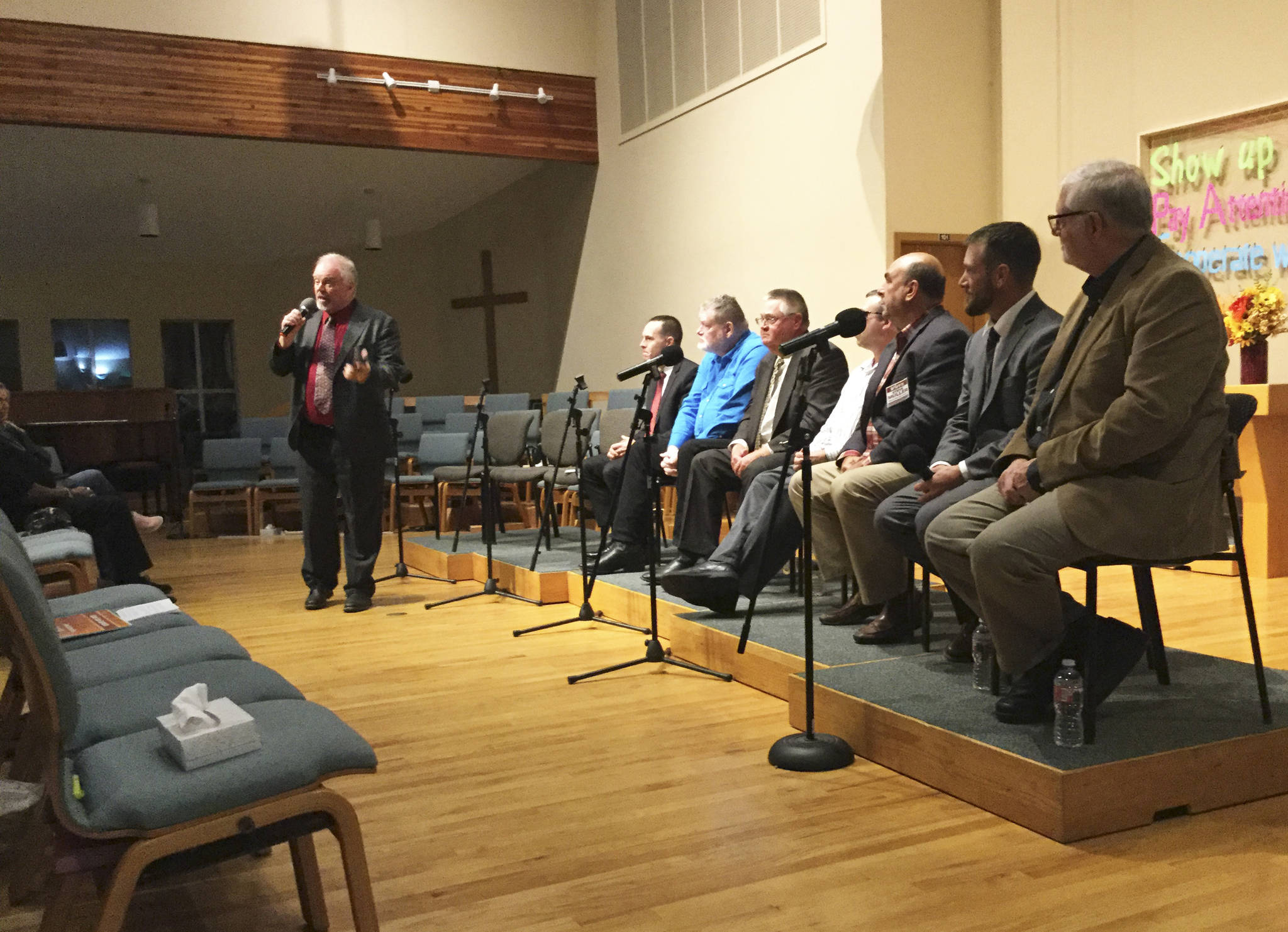MARYSVILLE – Opioid crisis response, higher wage jobs closer to home and new schools at a time when student enrollment is declining and test scores are so-so were among issues debated at a candidates forum Tuesday night.
The forum was hosted by The Marysville Globe and moderated by Managing Editor Steve Powell at Marysville United Methodist Church.
The panel featured candidates from contested races for mayor, city council and school board.
Jon Nehring is seeking a third four-year term as mayor, facing challenger Mike Patrick, an operations expert with 31 years at The Boeing Co., who is running on a “fresh ideas” platform.
In council races, Jeff Seibert, a 16-year council veteran and electrician who was unseated two years ago, is facing Kelly Richards, a para-professional with the Marysville School District who has served seven years on the city’s planning commission. The seat became open when Rob Toyer threw his hat in the race for Snohomish County Treasurer.
Steve Muller, seeking to retain his council seat, joined fellow panelists at the forum, but his challenger, political newcomer Katherine Iverson, was a no show.
In school board races, Dist. 5 director Tom Albright appeared without challenger Halleh Stickels. Conversely, incumbent Dist. 2 director Mariana Maksimos did not attend, but her contender, Paul Galovin, a carpenter and Army National Guardsman, was there.
Nehring touted the city’s police embedded social worker program that offers a compassionate approach to taking opioids and drugs off the streets in exchange for wraparound services, and giving a willing addict or homeless person a second crack at life.
“That person is a human being,” Nehring told the some 60 residents who attended. But from a public safety standpoint, he added, “Enforcement is what’s in the best interest for citizens.”
Candidates generally supported the program as an option for those who want help, while still meting out punishment for those who choose to continue a life of crime.
Employment
Richards said more employment closer to home is a key issue. He said the Cascade Industrial Center, Regional Apprentice Pathway Task Force and working with Arlington and the county will provide a much-needed boost to the economy.
“We’re spending way too much time in traffic,” Richards said of daily commutes. “It will be nice to have some local employment and industry for locals.”
Seibert reminded that when he served on the council as the early seeds of a spacious industrial center between Marysville and Arlington took root, developers were knocking down the door to build houses instead, but the mayor and council stood their ground.
Traffic
With more jobs comes more traffic.
Nehring said his administration has worked to bring $150 million in grant-funded transportation projects to keep apace with growth. Projects include the First Street Bypass, 88th Street NE improvements and the 156th Street/I-5 overpass, with future on-off ramps in the north end.
Muller, a lifelong Marysville resident and businessman, said he was involved on several leadership teams that helped build Cedar Field, the YMCA and other community assets before he joined the council.
“You may not remember a long time ago, but there was a lot of dysfunction in the city council and things weren’t getting accomplished,” he said. “I’m not a lifelong politician, but I do love this community.”
Schools
If there is a No. 1 weakness in our city, Muller said, it is Marysville’s schools. From the standpoints of accountability and quantifiable results, you can see progress in areas like crime statistics, thriving business activity and visible traffic infrastructure. Not so schools.
Galovin said the community has to form a united front and become invested in education for the good of its children.
He said new and renovated facilities are his priorities. Schools such as Liberty Elementary built in 1951 are long overdue for replacement, and the community has to come together and pass a bond or levies to modernize them.
“I’m going to try to make the school district look better in your eyes,” Galovin said. “I want open communication. I want to open up those doors. Communication and trust are key in order to ask for money and build more schools.”
School board member Tom Albright called on voters to urge state lawmakers to push for a simple majority for school bond passage and do away with the 60% rule.
“We can pass Tim Eyman’s crazy stuff for 50 percent,” Albright said. “We have to see (passing a bond for new schools) as something that our community has to do.”
He said a capital levy would enable the district to do some delayed building maintenance, but that barely scratches the need.
Albright said his nine years on the school board has been rewarding. The administration and teachers have weathered incredibly challenging times, are making progress in some areas and have some exciting things happening.
Albright said he sees three challenges ahead: equity, seeing that kids get what they need to succeed in a district that is becoming more diverse, both culturally and socially; prioritizing and shaping programs; and sustaining those programs financially with stability in staff.
Patrick has been an ardent supporter of bringing a hospital to Marysville.
Nehring said there are few communities that wouldn’t want to have their own hospital, but it should be privately funded, not based on a public district that further impacts taxpayers.
The forum stayed cordial, other than a swipe by Patrick at Nehring’s amassed campaign war chest, with more than half of his funds generated from outside interests versus his own smaller and mostly self-funded campaign.
And Richards asked challenger Seibert why he hasn’t been seen at community events since he lost his council seat.
Seibert said work as an electrician on Boeing and high school project sites hadn’t left a lot of time for being active.
“I feel now I’m ready to start that again,” he said.



